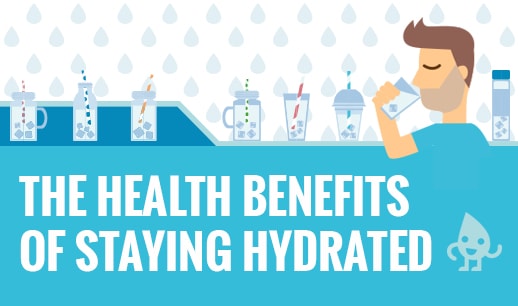Whether you are a fitness freak or a lazy bum, an athlete or someone who simply exercises for recreation, staying hydrated is crucial. Being properly hydrated will boost your performance and reduce risk of injury.
Staying hydrated means consuming the right amount of water in limited quantities throughout the day and especially before, during and after exercise.
Why Is Water Important?
Water regulates your body temperature, lubricates your joints, helps transport nutrients to give you energy, aids in mental activity and keeps you healthy.
Water is essential during workouts to maintain blood volume and allow muscle contractions to take place. During exercise, your body maintains optimal body temperature by sweating, resulting in loss of body fluid at an accelerated speed, along with that water critical nutrients and electrolytes are also depleted.
Drinking water during exercise is necessary to replace fluids lost in sweat and other minor losses due to breathing, spitting and vomiting. This will reduce the risk of heat stress, maintain normal muscle function, and prevent low performance due to dehydration. When you drink less water there is an increase in heart rate and body temperature, especially when exercising in the heat. You feel tired, tend to perceive the exercises to be tougher to complete, have muscle cramps or even dizziness.
Dehydration of greater than 2% loss of body weight increases the risk of nausea, vomiting, diarrhea, lack of sweating, muscle cramps, dry skin and other gastro-intestinal problems during exercise. Symptoms of severe dehydration can include mental confusion, weakness, feeling fatigued or disoriented, headaches, dry eyes, blurred vision and even loss of consciousness.

Tips For Staying Hydrated
- Always start exercising after being well hydrated.
- Fluid needs vary for individuals based on activity, intensity, environmental conditions, body size and training status.
- Continue taking big gulps of water every 15 to 20 minutes during exercise.
- After exercising, drink water to match the water weight you have lost during your workout.
- Your approximate requirement of water (in ounces) is half of your body weight (in pounds), it may however depend upon the intensity of your physical activity and other environmental conditions too.
- Opt for plain water as it is effective for fluid replacement and is sufficient for both sedentary and active individuals.
- Sports drinks have an advantage over water as they replenish sodium lost due to excessive sweating and carbohydrates in them provide instant muscle energy. Try them when you perform high intensity and endurance workouts.
- Drink whenever you feel thirsty to avoid bloating.
Each day you need to make a conscious effort to stay hydrated to ensure you get a fluid workout


